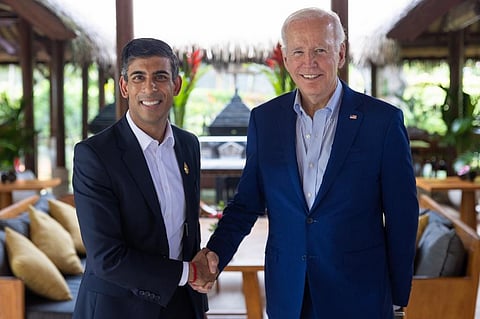Special Relationship: New Anglo-American energy partnership is Western fossil fuel hypocrisy at its best
The United States and the United Kingdom announced an “energy security and affordability partnership” on December 7, 2022. It talks about collaboration on energy efficiency, nuclear and renewables. But the major takeaway from the deal is that the amount of liquified natural gas (LNG) being supplied by the US to the UK will now be more than doubled.
The deal has been announced at a crucial time when G7 countries have already signed Just Energy Transition Partnership (JETP) deals with South Africa (last year), Indonesia (this year) and Vietnam (very soon) to transition these coal-based economies to renewables.
The latest Anglo-American deal clearly seems to be a move to fill the gap in the energy basket of the UK, post its decision to halt fuel imports from Russia over its invasion of Ukraine.
In 2021, imports from Russia made up 4 per cent of gas, 9 per cent of oil and 27 per cent of coal used in Britain. These imports were worth a combined 4.5 billion British pounds.
The Russian Federation invaded Ukraine February 24 this year. The UK government subsequently committed to ending imports of oil and coal from Russia by the end of the year and ending imports of gas from Russia “as soon as possible thereafter”.
Recently, the UK government legislated a ban on Russian gas. This will come into force from January 1, 2023.
As of 2021, natural gas constituted 42 per cent of the total inland primary energy consumed in the UK. Domestic gas production in the country met 42 per cent of the demand while almost 58 per cent of gas was imported.
Domestic production reached a record low due to maintenance issues and post-covid, the demand for gas also increased by 5.9 per cent. All this led to a growth of 17 per cent in the natural gas imports of the UK in 2021, compared to 2020.
Britain imports gas from nine countries to balance its energy security. Imports of natural gas come to the UK via pipelines from Norway, the Netherlands and Belgium or as LNG via ship.
Norway is the biggest supplier of natural gas to the UK (63 per cent of total imports). Historically, large parts of LNG imports to the UK have come from Qatar, peaking at 98 per cent in 2011.
In 2021, the UK imported 39 per cent of LNG from Qatar. This was followed by 26 per cent from the US and 21 per cent from Russia.
This 21 per cent from Russia is being completely shut now. Instead of filling this gap with renewables or other non-fossil fuels, the UK has gone ahead and signed a deal with its traditional transatlantic ally which will more than double the supply of LNG.
Under the deal, the UK LNG supply will rise to 9-10 billion cubic metres, from around 3.9 billion cubic metres in 2021.
Climate hypocrites?
On the one hand, German and US negotiators are busy convincing countries like India to come on board and sign JETP deals to phase out coal. On the other, they are signing deals promising huge exports of LNG to UK.
This could just be the proverbial tip of the iceberg and many other similar LNG deals could be in the pipeline for other parts of Europe as well wherever possible.
The Russian invasion of Ukraine led to a big vaccum in the natural gas market of Europe. Russian oil and gas is finding new markets in Asia. Meanwhile, US oil and gas companies are rushing in to fill the gap in Europe.
Concerns have been expressed about US companies making such deals. That is because these exports have led natural gas prices in the US to surge to their highest ever in over a decade, making it painful for the American people even as US oil and gas drilling companies are filling their pockets.
This raises questions about whom does the US government actually wants to benefit by making such deals.
The UK’s buck on hypocrisy too doesn’t stop at the US-UK Energy deal, as it has sanctioned the opening of a coal mine in Cumbria, the country’s first in 30 years.
Russia, until last year, was supplying 47 per cent of the coal consumed by the UK. As this supply has come down to 19 per cent this year, the UK has gone ahead and opened a coal mine to fill the gap instead of exploring cleaner energy options.
The US-UK deal highlights the fossil fuel addiction of the Western world which otherwise masquerades as a leader in the drive to make the globe carbon-free in the future.
The G7 has been selling deals to developing countries with the major chunk of funding in the form of concessional loans. But it has not stuck its own head out by taking an action or initiative that the rest of the world can emulate.

